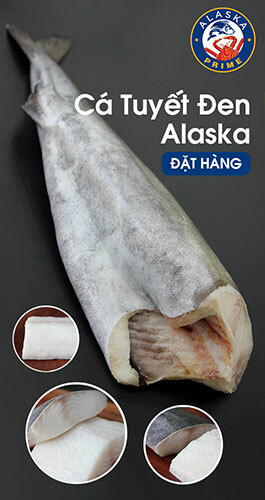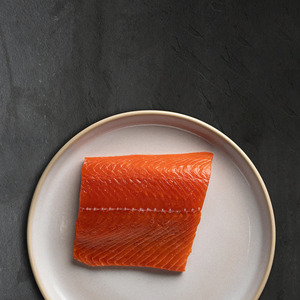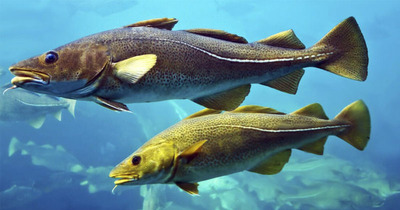1/ The importance of protein for health
Protein is one of the most important nutrients for human health, especially for the development of children. Fish is one of the rich sources of protein and other necessary nutrients that provide the body with important nutrients to maintain optimal health and development.

In this introduction, we will explore the importance of protein for health and why protein in fish plays a vital role in the development of children. Additionally, the introduction will also focus on providing an overview of the article's content, the main topics that will be discussed, and how the content will be presented to provide the best possible effectiveness for the readers.
2/ Protein in fish and the human body
Protein is one of the essential nutrients for human health, playing an important role in building and protecting body cells, providing energy for the body, and participating in the process of metabolism and metabolism.
In fish, protein is found in the form of amino acids, which are the basic building blocks of protein. In addition, fish also contain many types of vitamins and minerals necessary for health, including vitamin D, vitamin B12, calcium, and omega-3.
When we eat fish, the human body will digest the protein into amino acids and use them to create other proteins, helping to build and maintain muscles, tissues, and cells in the body. If the body is not provided with enough protein, the functions of the body will be affected, leading to malnutrition, sexual weakness, and immune deficiency.
Therefore, supplementing enough protein from food, especially from fish, is very important for human health, especially for children in the developmental stage.
2.1/ Mechanism of protein absorption in the body
The mechanism of protein absorption in the body occurs through the following steps:
Digestion: Before being absorbed, protein needs to be broken down into smaller amino acids. The digestion process takes place in the stomach and intestines, with the participation of protein-digesting enzymes.
Absorption: Amino acids are absorbed into the blood through the cells of the large intestine. These cells function to absorb nutrients from food.
Transportation: After being absorbed into the blood, amino acids are transported to cells and tissues in the body. They are used to regenerate and build new cells, including muscle cells, cartilage tissue, skin, and hair.
Metabolism: Any remaining amino acids after cell regeneration and reconstruction are converted into energy to maintain other body functions.
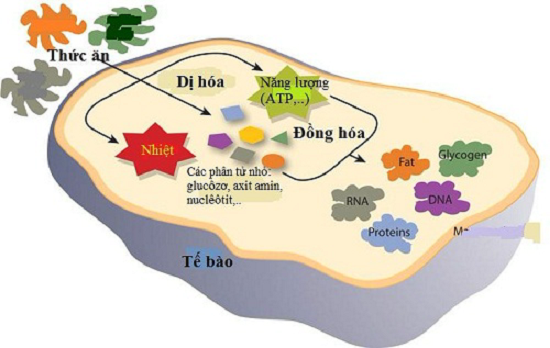
However, not all types of protein can be easily absorbed into the body. Proteins with high biological value, that is, containing all necessary amino acids for health, will be absorbed and used more effectively than other types of protein. And fish is one of the highest biological value protein sources, providing all necessary amino acids for the development and maintenance of body health.
2.2/ The benefits of protein in fish for human health
Building and protecting body cells: Protein is the main component of body cells, helping to build and regenerate new cells. It also plays an important role in protecting cells from harmful agents and ensuring the efficient functioning of organs and body parts.
Enhancing bone and muscle health: Protein in fish contains essential amino acids for building and maintaining healthy muscles and bones. It also helps to recover muscles after exercise and minimize muscle damage.
Supporting the immune system: Protein helps to produce antibodies and similar substances to support the immune system in combating disease-causing agents.
Providing energy: Protein also provides energy for the body and helps to maintain the health and development of other body parts.
Weight loss: Protein is an important nutrient in a weight-loss diet because it helps to reduce hunger and increase satiety. Fish is a nutrient-rich protein source that not only helps with weight loss but also provides many health benefits.
Reducing the risk of cardiovascular disease: Protein in fish helps to reduce the risk of cardiovascular disease by lowering the amount of bad cholesterol in the blood and enhancing cardiovascular health.
Improving brain function: Protein in fish is also a source of beneficial amino acids for the development and functioning of the brain, helping to improve cognitive functions such as concentration, memory, and reasoning.
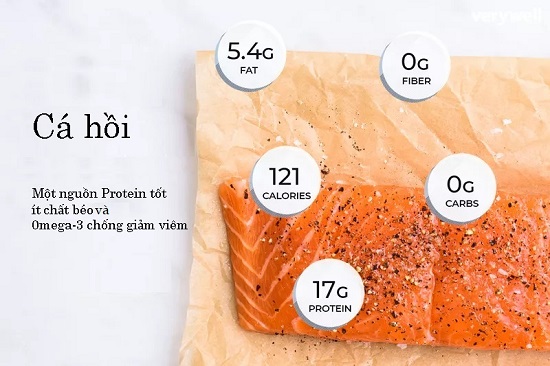
In summary, providing adequate protein from food sources, especially protein in fish, is crucial for human health. Protein is a necessary nutrient for building and maintaining muscles, bones, and cells in the body. Additionally, it supports the immune system, provides energy, and aids in weight loss. Fish is a nutrient-rich protein source with low levels of saturated fat, helping to reduce the risk of cardiovascular disease and improve brain function.
However, it's important to note that the use of fish in the diet should be carefully considered. If you eat too much fish, you may be exposed to significant amounts of copper and mercury from the food, which can be harmful to your health. Therefore, you should consume fish in appropriate quantities and choose the least toxic types of fish to protect your health.
In conclusion, using fish is an excellent way to provide protein and other nutrients to the body, helping to maintain optimal health and development.
3/ Fish and Nutritional Value
Fish meat is an important and necessary source of nutrition in human diet. It contains a lot of protein and omega-3 fatty acids that protect the heart, reduce the risk of cancer, and help enhance brain function. In addition, fish also provides important vitamins and minerals such as vitamin D, vitamin B12, selenium, iodine, and calcium. A diet rich in various types of fish will help the body absorb all necessary nutrients and maintain good health.
3.1/ Fish is rich in protein and essential nutrients
Fish is a high-quality protein source and rich in essential nutrients for health. 100 grams of fish meat contains about 20-25 grams of protein, providing most essential amino acids for the body. Additionally, fish contains many omega-3 fatty acids, vitamin D, vitamin B12, selenium, iodine, and calcium.
Omega-3 fatty acids in fish include EPA and DHA, which have been shown to be beneficial for the heart, reduce the risk of cancer, and help enhance brain function. Vitamin D in fish helps absorb calcium and phosphorus, maintaining bone health. Vitamin B12 is an important vitamin for brain function and the nervous system, while also boosting the immune system. Selenium and iodine are also essential minerals for human health.
Overall, fish not only is rich in protein but also provides many essential nutrients for health, helping maintain a healthy body and fight against diseases.
3.2/ Fish and weight loss, heart health improvement
Fish is an excellent food source for people who want to lose weight and improve heart health. It is a source of high-quality animal protein with fewer calories than red meat, thus helping to effectively reduce weight.
In addition, fish contains many omega-3 fatty acids, especially EPA and DHA, which reduce the risk of heart disease by lowering triglyceride levels in the blood, reducing blood pressure, and reducing the risk of stroke. A study also showed that regularly eating fish can reduce the risk of heart disease by 15-30%.
However, when choosing to eat fish, it is important to pay attention to the preparation and selection of suitable types of fish to avoid pollution due to harmful substances in seawater. Fish should be prepared by methods such as grilling, steaming, dipping in sauce, etc., instead of frying to reduce calorie and fat intake.
In summary, fish is a good food for health, helping to lose weight and improve heart health, but it is important to choose the right type of fish and prepare it properly to maximize its nutritional value.
4/ Types of fish rich in protein and how to use them
Fish is a rich source of nutrition and protein, so it is very important in the human diet. Types of fish such as salmon, tuna, mackerel, sardines, and trout are all high in protein and beneficial omega-3 fatty acids for health. The use of these types of fish is very diverse, and can be prepared into grilled, steamed, fried, stewed, soups or processed into sushi, sashimi, fish salads... However, you should ensure to prepare fish properly to avoid harmful effects on health.
4.1/ Types of fish rich in protein and their nutritional value
There are many different types of fish that can provide different amounts of protein and nutritional value. Here are some types of fish that are high in protein and their nutritional values:
Tuna: Tuna is one of the highest types of fish in protein content, containing about 30 grams of protein in 100 grams. It is also a good source of omega-3 fatty acids, vitamin D, and minerals such as selenium and iodine.
Salmon: Salmon is a type of fish rich in protein and omega-3 fatty acids. 100 grams of salmon contains about 20-25 grams of protein and over 2 grams of omega-3 fatty acids. It is also a source of vitamin D, vitamin B12, and selenium.
Sardines: Sardines are a small type of fish, but they are very high in protein, with about 25 grams of protein in 100 grams. Sardines are also a source of omega-3 fatty acids, vitamin D, and calcium.
Cod: Cod is a type of fish with high protein content, containing about 20-25 grams of protein in 100 grams. It is also a source of omega-3 fatty acids and vitamin B12.
Tilapia: Tilapia is another type of fish that provides a significant amount of protein, with about 20 grams of protein in 100 grams. It is also a source of vitamin D, vitamin B12, and minerals such as selenium and phosphorus.
In summary, these types of fish are all good sources of protein and nutrition for human health, but it is important to choose fresh and delicious fish and prepare them properly to maximize their nutritional value.
4.2/ How to use fish to supplement protein for the body
Fish meat is an important source of protein and nutrition for the body. Here are some ways to use fish to supplement protein for the body:
Grilling: Grilling fish is a simple and delicious way to take advantage of the protein in fish. You can grill fish on a griddle or in the oven, depending on your preferences and available equipment.
Steaming: Steaming fish is a simple way to retain the nutritional value of fish. You can steam fish with vegetables to increase fiber and vitamin and mineral content.
Frying: Fried fish is a popular way of cooking, but you should limit its use too often to avoid weight gain and high blood pressure.
Stewing: Stewing fish with vegetables and spices is a delicious way to enjoy fish while retaining its nutritional value.

In conclusion, fish is a great source of protein and nutrition for the body, and there are many ways to prepare and enjoy it while maximizing its benefits.
5/ The impact of protein deficiency on health
Protein deficiency can cause many negative effects on health, especially for the bodies of adults and developing children. Protein deficiency can cause malnutrition, body weakness, reduced immunity, slow development, reduced nerve function, fatigue, body weakness, and reduced ability to recover from illness. Therefore, sufficient protein must be provided to maintain health and body development.
5.1/ The negative effects of protein deficiency on health
Protein deficiency can cause many negative effects on human health. Below are some negative effects of protein deficiency on health:
Malnutrition: Protein deficiency can cause malnutrition, reducing the body's ability to absorb nutrients and causing slow development.
Body weakness: Protein deficiency can cause body weakness, reducing the ability to perform activities, work, and increasing the risk of disease.
Reduced nerve function: Protein is an important component of nerve cells. Protein deficiency can cause reduced nerve function, reducing the ability to concentrate, learn, and causing fatigue.
Reduced immunity: Protein deficiency can reduce the body's immune system, increasing the risk of infection and other diseases.
Reduced ability to recover from illness: Protein is an important component in enhancing the body's recovery ability after illness. Protein deficiency can reduce the body's ability to recover.

Therefore, sufficient protein must be provided to the body to avoid deficiency and ensure health.
5.2/ How to supplement protein from fish to ensure health
To ensure adequate protein intake for the body, fish is one of the important and nutritious protein sources. Below are some ways to supplement protein from fish to ensure health:
Eat protein-rich fish: Fish such as salmon, tuna, mackerel, squid, snowfish, basa fish, etc. are protein-rich fish. Eating these types of fish will provide the necessary protein for the body.
Use fish in various dishes: Fish can be used in many different dishes such as grilled, stewed, fried, stir-fried, etc. to increase the protein content in meals.
Use protein-rich fish products: Fish products such as dried squid, fish balls, fried fish, etc. are nutritious and easy-to-use protein sources.
Combine fish with other protein-rich foods: Combining fish with other protein sources such as chicken, beef, beans, etc. can provide a balanced protein diet.

However, when using fish meat to supplement protein, it is important to choose fresh, uncontaminated types of fish and prepare them properly to avoid health problems.
6/ Summary of the benefits of protein in fish for health and how to use it
In summary, fish is a high-quality protein source that provides essential amino acids to the body, helping to enhance health and muscle development. Additionally, fish is rich in other nutrients such as omega-3 fatty acids, vitamin D, iron, zinc, and calcium, which help to strengthen immune function, reduce the risk of cardiovascular and diabetes-related diseases.
To supplement protein from fish for the body, one can eat protein-rich fish such as salmon, tuna, mackerel, squid, snowfish, basa fish, use fish in dishes, consume products made from protein-rich fish, and combine fish with other sources of protein. However, it is important to choose fresh, uncontaminated types of fish and prepare them properly to ensure good health.
Therefore, fish is a high-quality protein and nutrient-rich source that plays an important role in maintaining and developing a healthy body. Supplementing protein from fish is a simple and effective way to ensure the necessary amount of protein for the body.
